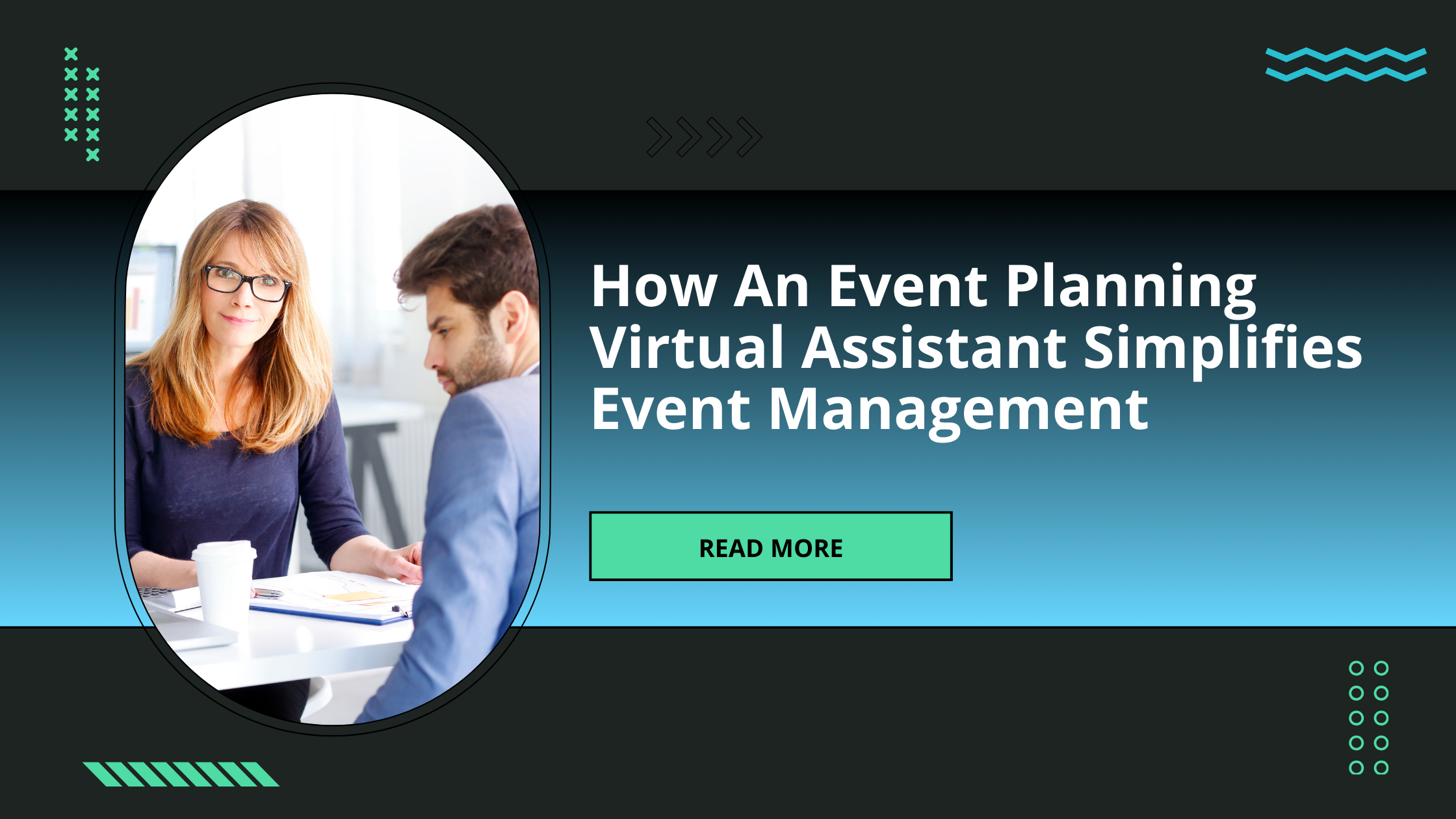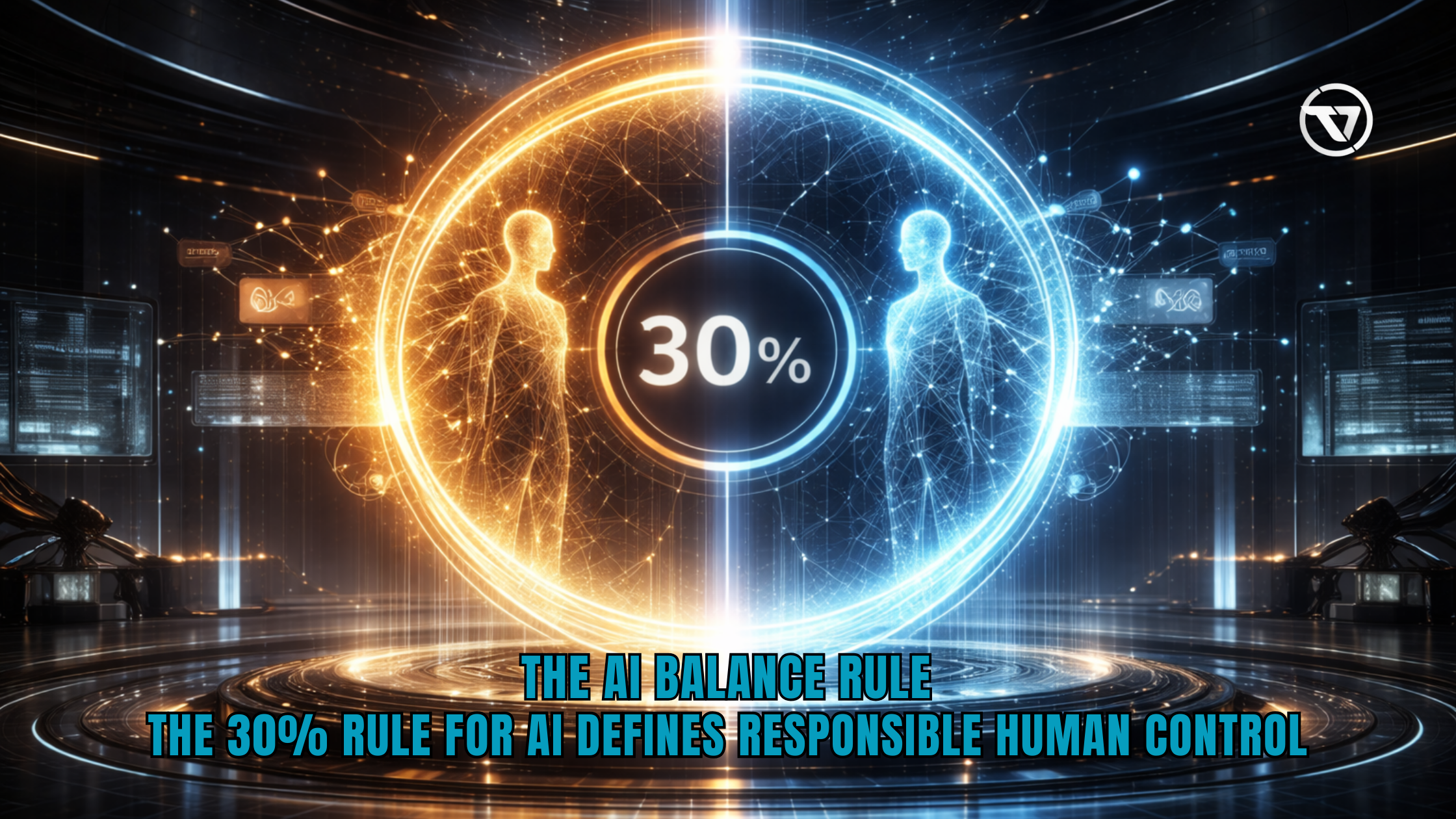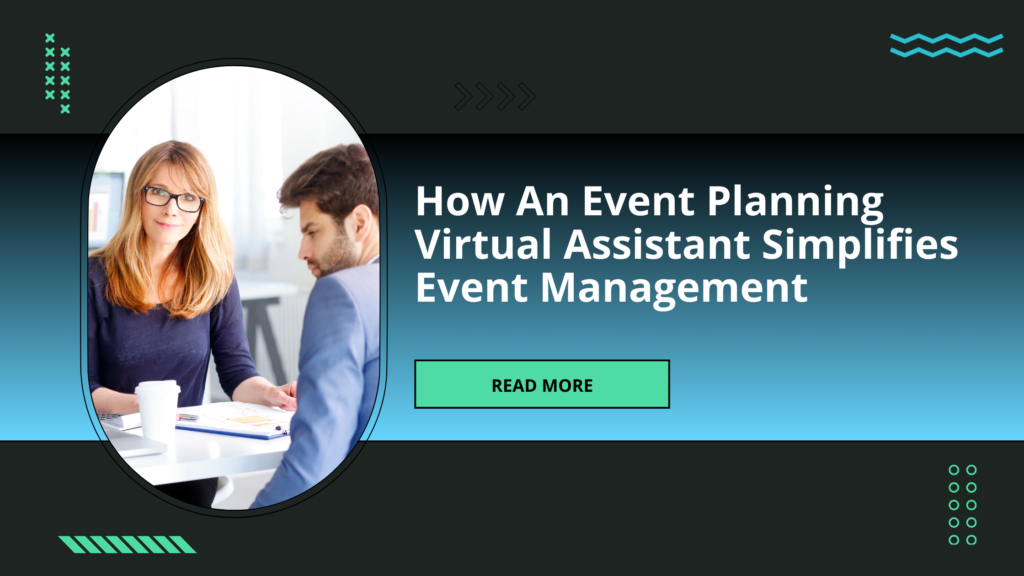
How An Event Planning Virtual Assistant Simplifies Event Management
An Event Planning Virtual Assistant helps businesses and individuals organize, coordinate, and manage events efficiently. From scheduling and vendor management to attendee communication and post-event follow-up, these assistants handle administrative and logistical tasks. By outsourcing event management, organizers save time, reduce stress, and ensure successful, well-coordinated events.
What Is an Event Planning Virtual Assistant?

An Event Planning Virtual Assistant is a remote professional who specializes in supporting the planning and execution of events. They manage administrative duties, coordinate with vendors, track budgets, and oversee logistics to ensure every detail of an event runs smoothly. According to Cvent, 49% of event planners say they spend more time on technology to streamline venue sourcing, meeting space diagrams, and vendor specifications to reduce planning friction.
Unlike traditional in-house staff, a virtual assistant for events offers flexible, cost-effective support without the need for full-time employment. They are ideal for corporate events, conferences, webinars, workshops, social gatherings, and large-scale celebrations.
How an Event Planning Virtual Assistant Works
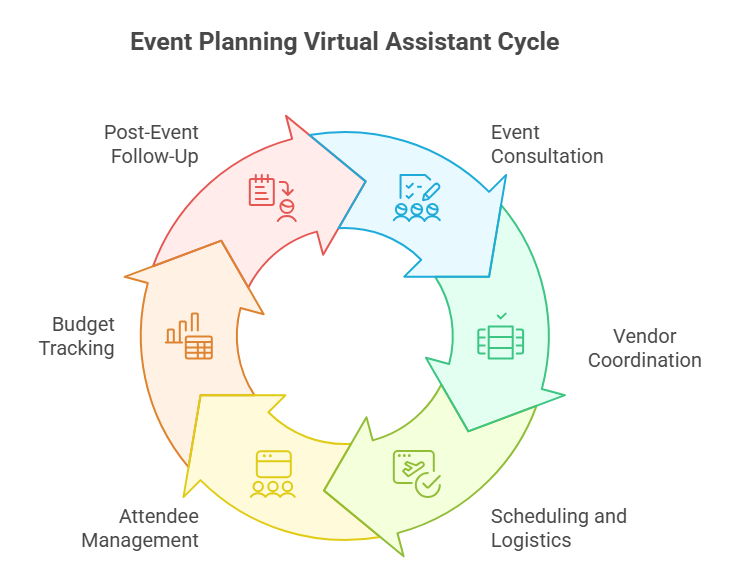
Hiring a virtual assistant for event management involves a structured and well-organised process. These professionals begin by understanding your goals and then move on to detailed coordination, communication, and execution. Below are the major steps in how an event planning virtual assistant works:
1. Event Consultation and Planning:
The virtual assistant begins by discussing event objectives, target audience, budget, and timelines with the client. They then create a detailed plan of action that covers strategy, responsibilities, and priorities. This ensures that the event has a clear roadmap from start to finish, minimizing confusion. By doing so, the assistant keeps the client informed while ensuring that all critical tasks are covered in advance.
2. Vendor Coordination:
Vendor management is one of the most time-consuming parts of event planning. A virtual assistant researches, communicates with, and negotiates with vendors such as caterers, venues, AV technicians, and decorators. They ensure all vendor services align with the client’s requirements while also staying within budget. This guarantees that everything from catering to sound systems works smoothly on the event day.
3. Scheduling and Logistics:
Managing the schedule of an event is complex but critical. Virtual assistants handle event timelines, confirm appointments, coordinate travel arrangements, and ensure all logistical aspects run seamlessly. This keeps the event structured and avoids last-minute disruptions. With clear scheduling, both vendors and attendees experience a hassle-free process.
4. Attendee Management:
Successful events require streamlined attendee communication. Virtual assistants create registration systems, send invitations, track RSVPs, and maintain communication with attendees. They also send reminders and provide necessary information, ensuring maximum participation. This personal touch enhances attendee satisfaction and encourages engagement.
5. Budget Tracking and Reporting:
Financial management plays a huge role in event success. Assistants monitor expenses, track invoices, and maintain budgets to ensure the event remains financially viable. They also generate cost reports for the client, allowing transparency and accountability. This helps avoid overspending while maintaining high event quality.
6. Post-Event Follow-Up:
After the event, virtual assistants don’t just stop working—they add value through follow-up. They collect feedback, send thank-you emails, and prepare post-event reports. These reports help clients measure the event’s success and identify improvement areas. It also leaves a lasting positive impression on attendees.
Key Features of an Event Planning Virtual Assistant
When hiring a virtual assistant for events, you can expect them to bring specific skills and features to the table. These key features enhance efficiency, professionalism, and success in event planning:
1. Task Management:
Handles a wide range of administrative and organizational tasks to keep events on track. They ensure no deadline is missed and no task overlooked.
2. Vendor Liaison:
Manages communication with vendors, from booking to final confirmations. They act as a bridge between the client and service providers to avoid confusion.
3. Budget Monitoring:
Tracks expenses, approves invoices, and maintains financial accountability throughout. This ensures events are managed within budget limits without compromising quality.
4. Attendee Coordination:
Handles registrations, invitations, reminders, and all attendee communication. Their support keeps guest management professional and smooth.
5. Timeline and Scheduling:
Creates detailed schedules and deadlines for all event activities. This ensures that everyone involved knows their role and timing.
6. Reporting and Feedback:
Prepares post-event reports, gathers attendee feedback, and suggests improvements. This data-driven approach helps optimize future events.
Benefits of Using an Event Planning Virtual Assistant
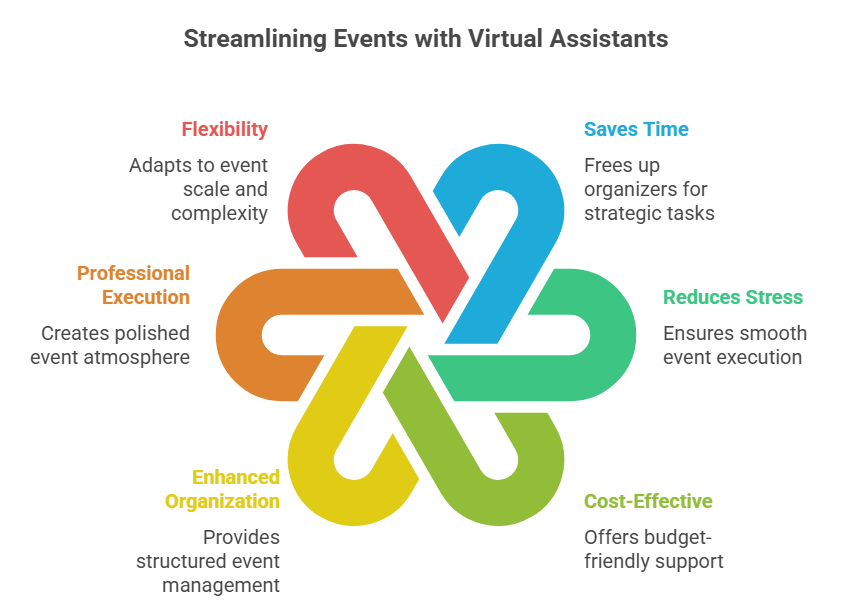
Outsourcing to a virtual assistant for events comes with many advantages. These benefits make them a valuable addition for individuals and businesses hosting any type of gathering. By leveraging their expertise, event organizers can focus more on strategy, while the assistant handles the time-consuming administrative and logistical work.
1. Saves Time:
One of the biggest advantages of hiring an event planning virtual assistant is the time saved on repetitive and administrative tasks. By delegating responsibilities such as vendor communication, attendee registration, and scheduling, organizers free up hours that would otherwise be spent on coordination. This extra time allows them to focus on higher-level strategies, event content, and ensuring the overall experience is impactful.
2. Reduces Stress:
Event planning can often feel overwhelming with so many moving parts to manage at once. A virtual assistant takes over the logistical and administrative burden, ensuring that nothing slips through the cracks. With expert support, organizers enjoy peace of mind, knowing that every detail is managed professionally and efficiently without unnecessary stress.
3. Cost-Effective:
Hiring full-time staff for event planning can be expensive, especially for small to medium-sized businesses. Virtual assistants provide a more budget-friendly option by offering flexible services tailored to specific needs. This means you only pay for the hours or tasks required, giving you professional support without the cost of a permanent employee. According to a survey by Remo, 40% of event planners cite budget management as a top challenge, underscoring how virtual assistants can help ease that burden.
4. Enhanced Organization:
An event planning virtual assistant brings structure and clarity to even the most complex events. They track every element of planning, from timelines and vendor agreements to attendee lists and budgets, ensuring nothing is overlooked. Their organisational skills create a streamlined workflow that keeps the event on track from start to finish.
5. Professional Execution:
Professional execution is critical to building a strong impression with attendees. Virtual assistants ensure that every aspect of the event runs smoothly, from on-time vendor deliveries to seamless attendee communications. Their experience and attention to detail help create a polished, professional atmosphere that strengthens both event quality and brand reputation.
6. Flexibility:
Virtual assistants can adapt their level of involvement based on the scale and complexity of your event. Whether you’re hosting a small workshop or a large corporate conference, they adjust their responsibilities accordingly to provide the right amount of support. This flexibility makes them an ideal choice for organizations that require both scalability and reliability in event planning.
How to Use an Event Planning Virtual Assistant
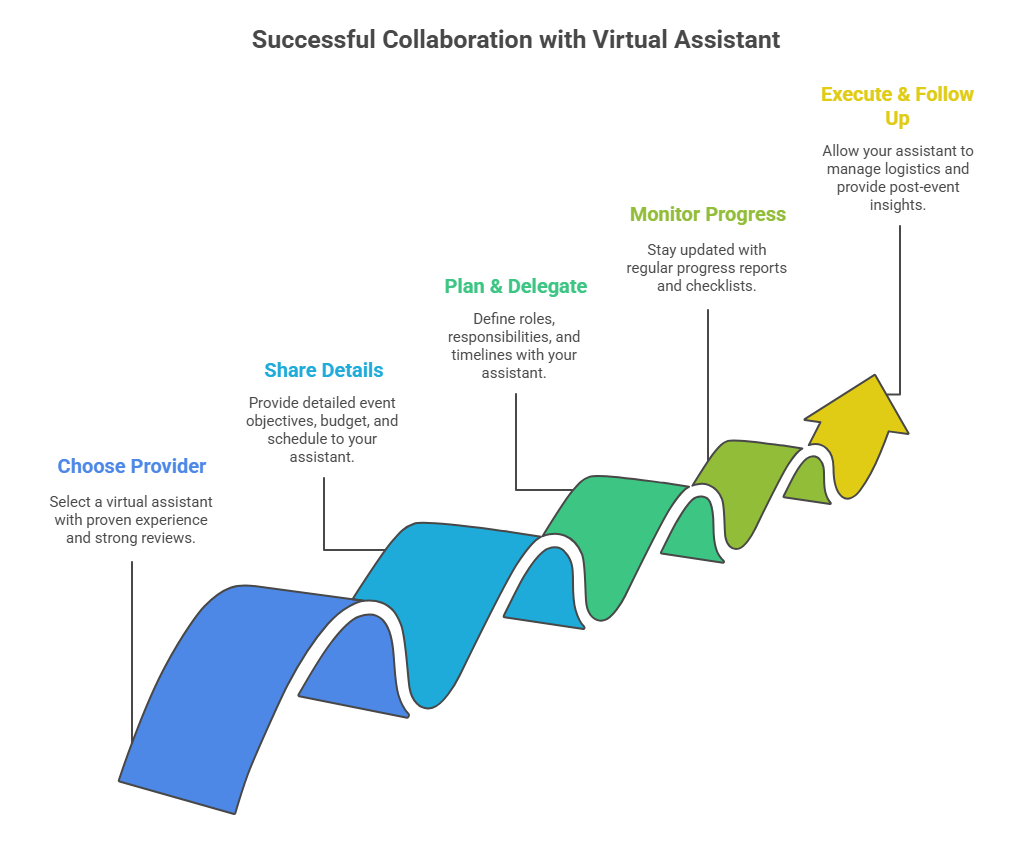
Getting started with a virtual assistant requires a structured approach. Here’s a step-by-step outline of how to successfully collaborate:
Step 1: Choose a Provider:
Select a virtual assistant with proven experience in managing events similar to yours. Look for strong reviews, testimonials, and references.
Provide detailed objectives, budget, schedule, and contacts to your assistant. The more information you share, the smoother the planning process.
Step 3: Plan and Delegate Tasks:
Work with your assistant to clearly define roles, responsibilities, and timelines. Delegation ensures accountability and efficiency.
Step 4: Monitor Progress:
Stay updated with regular progress reports and checklists. This keeps both the client and assistant aligned at every stage.
Step 5: Execute and Follow Up:
Allow your assistant to manage the logistics, communications, and follow-up reports. This ensures seamless event delivery and valuable post-event insights.
Limitations of an Event Planning Virtual Assistant
While highly effective, virtual assistants have a few limitations that clients should consider. Being aware of these ensures realistic expectations:
1. Limited On-Site Presence:
Since they work remotely, physical in-person event support may require extra staffing. Clients may need a combination of onsite and virtual support.
2. Dependence on Communication:
Effective event execution depends on timely communication and clear client instructions. Miscommunication can delay processes.
3. Scope of Expertise:
Some specialized event functions, like high-tech audiovisual setup or custom décor, may require external vendors or consultants.
TaskVirtual: Your Partner in Event Support Services
Planning and executing events can be overwhelming without the right professional support. From vendor negotiations to attendee management, small mistakes can have a big impact on event success. TaskVirtual helps solve these challenges by offering expert Event Planning Virtual Assistant services tailored to meet diverse needs.
1. Expert Consultation and Planning:
TaskVirtual’s experienced assistants work with you to define event goals, budget, and timelines. They provide detailed strategies and actionable steps to ensure smooth execution.
2. Affordable and Flexible Pricing:
Hiring full-time event managers can be costly. TaskVirtual offers professional event planning assistance at competitive rates, with pricing plans starting from just $3.12/hour to $14.99/hour, making expert event support accessible and budget-friendly.
3. Comprehensive Event Solutions:
TaskVirtual handles everything from vendor coordination and scheduling to attendee communication and budget tracking. Their scalable solutions adapt to both small gatherings and large-scale corporate events.
4. Ongoing Support and Quality Assurance:
Beyond planning, TaskVirtual ensures continuous communication, updates, and improvements. Their support guarantees that events are stress-free and professionally executed.
5. Proven Track Record of Excellence:
With 364 positive reviews and a 4.7-star rating on trusted VA platforms, TaskVirtual has built a strong reputation. Clients rely on their expertise to deliver seamless, successful events that leave lasting impressions.
Final Thoughts on Event Planning Virtual Assistants
An Event Planning Virtual Assistant is a game-changing partner for businesses and individuals looking to host smooth, professional events. By handling administrative tasks, vendor coordination, scheduling, and attendee communication, these assistants save time, reduce stress, and ensure flawless execution.
Whether it’s a corporate conference, virtual webinar, hands-on workshop, or private social gathering, hiring a virtual assistant enhances organization, boosts efficiency, and guarantees better outcomes.
FAQ: Event Planning Virtual Assistant
1. What is an Event Planning Virtual Assistant?
A remote professional who assists with organizing, coordinating, and managing all aspects of an event.
2. Who can benefit from these services?
Businesses, entrepreneurs, event organizers, and individuals hosting corporate or social events.
3. Do virtual assistants handle budgets?
Yes, they track expenses, approve invoices, and ensure events remain financially efficient.
4. Can they manage attendees?
Absolutely. They handle registrations, RSVPs, reminders, and direct communication with participants.
5. Is it cost-effective to hire a virtual assistant for events?
Yes, outsourcing is often more affordable than hiring full-time staff while providing expert-level event support.
